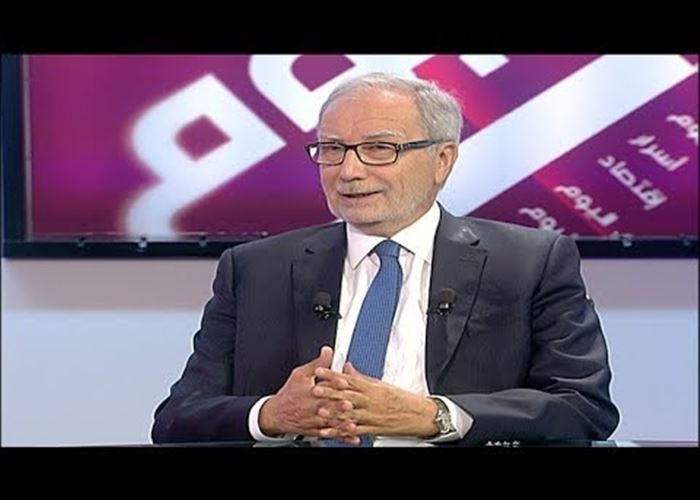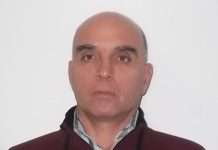
A Friendly Divorce with Hezbollah
Dr. Toufic Hindi/Asharq Al-Awsat/November 05/2021
That is the conclusion I had reached with my comrade and companion, Dr. Mohamad Chatah, before he was assassinated. I openly expressed this “dangerous” opinion in a dialogue moderated by Marcel Ghanem on LBCI the day before my dear friend Mohamad was buried.
But what does a friendly divorce with Hezbollah mean? At the time, it became clear to Mohamad (but it had been clear to me since 2005) that being part of governments that include Hezbollah and discussing a “defense strategy” with it are of no use. Indeed, it gives the party the cover of Lebanese legitimacy for free while the party does what it wants without taking the others’ opinion into consideration, thereby pushing Lebanon in the direction of becoming a province of the Islamic Republic of Iran.
A friendly divorce with Hezbollah also implied leaving it alone responsible for its actions and launching an inclusive, peaceful and sovereignist movement that calls for liberating Lebanon from the Iranian occupation imposed through Hezbollah (though we should keep in mind that the party is an integral part of the Islamic Republic of Iran) and implementing the segments of UN Resolution 1559 regarding militias handing in their weapons.
The March 14 alliance had refused to have the United Nations implement this Resolution in 2005, arguing that this would endanger national unity and that the Lebanese would manage to achieve this themselves through calm dialogue with Hezbollah (roundtable on a defense strategy that led to the War of 2006 and Hezbollah disregarding the Baabda Declaration when it was issued on 11-6-2012).
This approach taken by March 14 spoke to its main components’ thirst for power after they had been deprived of it following the 2005 elections and the formation of the Quadripartite Agreement (Hezbollah, the Amal Movement, the Progressive Socialist Party, and the Future Movement) as well as some of those who had taken part in Qornet Shahwan.
During the eulogy he gave on the day Mohamad was buried, former Prime Minister Fouad Saniora announced that positions would change after the assassination. However, shortly before the burial and during the funeral, he warned me that my discourse was dangerous. I replied that I had been speaking what the deceased had been on the deceased’s mind and that I felt that I owed it to him to launch a new phase after his assassination.
Nevertheless, a totally opposite stance was taken by the Future Movement, appointing Tammam Salam prime minister and amazing us with its theory of managing the dispute with Hezbollah by appointing radical ministers (here I am referring to Nohad Mashnouk and Ashraf Rifi), as well as another ridiculous theory of dissociation.
This theory brought us Najib Mikati’s second government (a March 8 government) after Hezbollah and its subordinates theatrically toppled Saad Hariri’s government on January 12, 2011, and Hariri went into voluntary exile. That was a new occasion for returning to power by acquiescing to Hezbollah once again instead of learning their lesson and not making excuses about the need to follow a “realistic” policy on the party. They chose to refrain from taking a stance to save Lebanon from the worst.
Worst of all, the crumbling components of the March 14 alliance went even further, electing Michel Aoun, Hezbollah’s primary Christian ally, president of the republic under the pretext that the presidential vacuum had been hurting the country. In truth, however, it was lust for power that compelled this decision. As a result, Saad Hariri formed two governments, the second of which collapsed with his decision to resign and evade responsibility on October 29, 2019, following the October 17 revolution. The weakened components of the March 14 alliance gave in to a proportional electoral law that granted Hezbollah a parliamentary majority in 2018, with Iran describing the Lebanese parliament as a parliament of resistance.
The truth is that since then, Hezbollah has controlled the country’s three constitutional institutions (presidency, parliament and the government), as well as controlling other state institutions and dominating the rotten, murderous and corrupt political class in all its components, as they are all playing under the statelet’s authoritarian rules.
It is not surprising that things have gotten so bad in Lebanon, and it is not surprising to see the Gulf states rise up against this state of affairs in Lebanon, as it undermines their strategic interests.
The solution is forming a broad, credible sovereignist alliance for peaceful change that works to save the country from Iranian occupation and the disastrous political class deeply entrenched in Lebanon’s socio-political structure, opening the door to a phase of recovery in which sovereignist youths can change Lebanon and lead it to the shores of security, stability, and sustainable prosperity.
الطلاق الحبي مع «حزب الله»
د. توفيق هندي/الشرق الأوسط/04 تشرين الثاني/2021
هذا ما كنت توصلت إليه مع رفيق الدرب الدكتور محمد شطح قبيل اغتياله. وقد أفصحت عن هذا الرأي «الخطير» علناً، في مقابلة متعددة الأطراف يديرها مارسيل غانم على شاشة الـ«LBC» في اليوم الذي سبق مراسم دفن صديقي العزيز محمد.
ولكن ماذا يعني الطلاق الحبي مع «حزب الله»؟ كان في ذلك الحين قد أصبح واضحاً لمحمد (ولكن كان واضحاً بالنسبة لي منذ عام 2005) أن المساكنة مع الحزب في الحكومات المتتالية منذ حكومة السنيورة الأولى (13 يوليو «تموز» 2005) كما الحوار معه عن «استراتيجية دفاعية» لا ينفع، لا بل إنه يعطيه غطاء لبنانياً شرعياً مجاناً في وقت أن الحزب يفعل ما يشاء من دون أخذ بعين الاعتبار الرأي الآخر، وبالتالي يدفع بلبنان إلى أن يصبح مقاطعة من الجمهورية الإسلامية في إيران.
كما أن الطلاق الحبي مع «حزب الله» كان يعني أيضاً تحميله حصراً مسؤولية أفعاله وأعماله، وبالمقابل الانطلاق بحركة سيادية جامعة سلمية تطالب بتحرير لبنان من الاحتلال الإيراني الممارس من خلال «حزب الله» («علماً» بأن الحزب جزء لا يتجزأ من الجمهورية الإسلامية في إيران) وتنفيذ الشق من القرار 1559 المتعلق بتسليم الميليشيات سلاحها الذي رفضت 14 آذار في عام 2005 تطبيقه من قبل الأمم المتحدة، بحجة أنه يستجلب المخاطر على الوحدة الوطنية وأن اللبنانيين كفيلون بتنفيذه في مرحلة لاحقة عبر الحوار الهادئ مع «حزب الله» (طاولات الحوار حول الاستراتيجية الدفاعية التي أنتجت حرب الـ2006 وتنكر «حزب الله» لإعلان بعبدا بتاريخ 11 – 6 – 2012 حين صدوره). غير أن توجه 14 آذار هذا كان يعبر عن تعطش المكونات الرئيسية لـ14 آذار للسلطة بعد حرمانها، انطلاقاً من انتخابات عام 2005 والاتفاق الرباعي («حزب الله»، وأمل، والتقدمي الاشتراكي، والمستقبل) بالإضافة إلى بعض قرنة شهوان.
وقد أعلن الرئيس فؤاد السنيورة يوم الدفن في خطبة رثاء محمد، أن الموقف لن يكون نفسه قبل اغتياله من بعده، غير أنه قبيل الدفن وعند تقبل العزاء أسر لي بأن كلامي خطير. فأجبته أن كلامي هذا هو ما كان يفكر فيه المرحوم، وللأمانة كان علي أن أتفوه به كي تفتح مرحلة جديدة بعد اغتياله.
غير أن تيار المستقبل اتخذ في حينه الموقف المعاكس بتسمية الرئيس تمام سلام لتشكيل الحكومة وأتحفنا بنظرية عقد النزاع مع «حزب الله» عبر تسمية وزراء راديكاليين، أعني نهاد المشنوق وأشرف ريفي، بالإضافة إلى نظرية سخيفة أخرى، عنوانها النأي بالنفس، علماً بأن هذه النظرية أتت بها حكومة ميقاتي الثانية (الثماني آذارية) بعد أن أسقط «حزب الله» وأتباعه بشكل مسرحي حكومة الحريري بتاريخ 12 يناير (كانون الثاني) 2011، وذهب الحريري إلى المنفى الطوعي. فكانت مناسبة جديدة للعودة إلى السلطة عبر مجالسة «حزب الله» الدونية مرة أخرى بدل أخذ العبر والكف عن التحجج بضرورة اتباع السياسة «الواقعية» تجاهه خلاصاً للبنان من الأعظم.
والأدهى، أن مكونات 14 آذار المتهالكة ذهبوا أبعد من ذلك بانتخاب ميشال عون الحليف المسيحي الأول لـ«حزب الله» رئيساً للجمهورية بحجة ضرر الفراغ الرئاسي ولكن بالحقيقة شغفاً بالسلطة. وكان من نتائجها تشكيل سعد الحريري حكومتين انتهت الثانية باستقالته في تاريخ 29 – 10 – 2019 على أثر ثورة 17 تشرين وهرباً من تحمل المسؤولية. وقد أذعنت مكونات 14 آذار المتهالكة لقانون انتخابي يعتمد النسبية أعطى لـ«حزب الله» في عام 2018 الغالبية النيابية بحيث وصّفت إيران في حينها البرلمان اللبناني بأنه برلمان المقاومة.
والحقيقة أنه منذ ذلك الحين، بات «حزب الله» يتحكم في المؤسسات الدستورية الثلاث (رئاسة الجمهورية، والبرلمان، والحكومة) بالإضافة إلى تحكمه في مفاصل السلطة الدولية الأخرى وسطوته على الطبقة السياسية المارقة الفاسدة القاتلة بمكوناتها كافة، التابعة مباشرة له أو حتى المشاكسة له، كونها تتعاطى هذه الأخيرة من داخل اللعبة السلطوية الدولتية.
فلا عجب أن يصل الوضع اللبناني إلى هذا الدرك، ولا عجب أن نرى دول الخليج تنتفض على هذا الواقع في لبنان لأنه يشكل ضرراً استراتيجياً لها.
والحل يكمن في تشكيل تحالف سيادي – تغييري سلمي واسع له مصداقيته يهدف إلى الخلاص من الاحتلال الإيراني كما من الطبقة السياسية المارقة المتجذرة في بنى الاجتماع السياسي اللبناني، مما يفسح بالمجال بعد مرحلة التعافي لنخبة من الشباب السيادي – التغييري بأن يأخذ لبنان إلى شاطئ الأمان والاستقرار والازدهار المستدام.
* سياسي لبناني





















